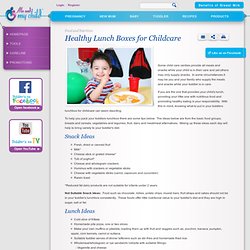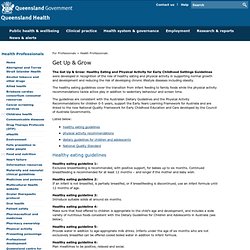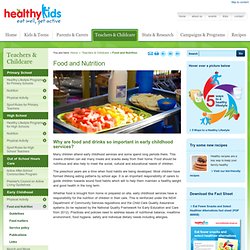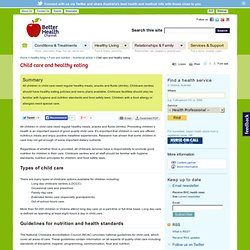

Page. Healthy Lunch Boxes for Childcare. Some child care centres provide all meals and snacks while your child is in their care and yet others may only supply snacks.

In some circumstances it may be you and your family who supply the meals and snacks while your toddler is in care. If you are the one that provides your child's lunch, providing your little one with nutritious food and promoting healthy eating is your responsibility. With this in mind, knowing what to put in your toddlers lunchbox for childcare can seem daunting. To help you pack your toddlers lunchbox there are some tips below. The ideas below are from the basic food groups; breads and cereals, vegetables and legumes, fruit, dairy and meat/meat alternatives. Snack Ideas Fresh, dried or canned fruit Milk* Cheese stick or grated cheese* Tub of yoghurt* Cheese and wholegrain crackers Hummus with crackers or vegetable sticks Cheese with vegetable sticks (carrot, capsicum and cucumber) Raisin toast *Reduced fat dairy products are not suitable for infants under 2 years.
Www.eatforhealth.gov.au/sites/default/files/files/the_guidelines/n55f_children_brochure.pdf. Healthy eating and physical activity for early childhood guidelines. The Get Up & Grow: Healthy Eating and Physical Activity for Early Childhood Settings Guidelines were developed in recognition of the role of healthy eating and physical activity in supporting normal growth and development and reducing the risk of developing chronic lifestyle diseases including obesity.

The healthy eating guidelines cover the transition from infant feeding to family foods while the physical activity recommendations tackle active play in addition to sedentary behaviour and screen time. The guidelines are consistent with the Australian Dietary Guidelines and the Physical Activity Recommendations for children 0-5 years, support the Early Years Learning Framework for Australia and are linked to the new National Quality Framework for Early Childhood Education and Care developed by the Council of Australia Governments. Listed below: Healthy eating guidelines Healthy eating guideline 1:Exclusive breastfeeding is recommended, with positive support, for babies up to six months. Healthy Kids : Food and Nutrition. Many children attend early childhood services and some spend long periods there.

This means children can eat many meals and snacks away from their home. Food should be nutritious and also help to meet the social, cultural and educational needs of children. The preschool years are a time when food habits are being developed. Most children have formed lifelong eating patterns by school age. It is an important responsibility of carers to guide children towards sound food habits which will to help them maintain a healthy weight and good health in the long term. Whether food is brought from home or prepared on site, early childhood services have a responsibility for the nutrition of children in their care.
Www.decd.sa.gov.au/familydaycare/files/links/Healthy__Safe_Food_Experi_1.pdf. Child care and healthy eating. All children in child care need regular healthy meals, snacks and fluids (drinks).

Promoting children’s health is an important aspect of good quality child care. It’s important that children in care are offered nutritious meals and enjoy positive mealtime experiences. Research has shown that some children in care may not get enough of some important dietary nutrients. Regardless of whether food is provided, all childcare services have a responsibility to promote good nutrition for children in their care. Childcare centres and all staff should be familiar with hygiene standards, nutrition principles for children, and food safety laws. Types of child care There are many types of childcare options available for children including: Long day childcare centres (LDCCC) Occasional care and preschool Family day care Extended family care (especially grandparents) Out of school hours care. Guidelines for nutrition and health standards Some of the issues covered include: